Business Ethics, Responsibility, Sustainability in Clothing Sector
VerifiedAdded on 2022/12/28
|11
|3755
|1
Report
AI Summary
This report provides a comprehensive analysis of business ethics, corporate responsibility, and sustainability within the clothing industry. It begins with an introduction to business ethics and its importance, followed by an overview of the clothing industry's global scope. The main body delves into key challenges, including child labor, low wages, health and safety risks, environmental degradation, and animal cruelty. It then explores best practices within the clothing sector, emphasizing ethical and moral considerations. Finally, the report offers recommendations for businesses in the clothing sector, taking into account global considerations to promote ethical and sustainable practices. The report utilizes secondary information to address the learning outcomes of identifying key challenges, analyzing moral considerations, and examining business responsibilities in a global context.
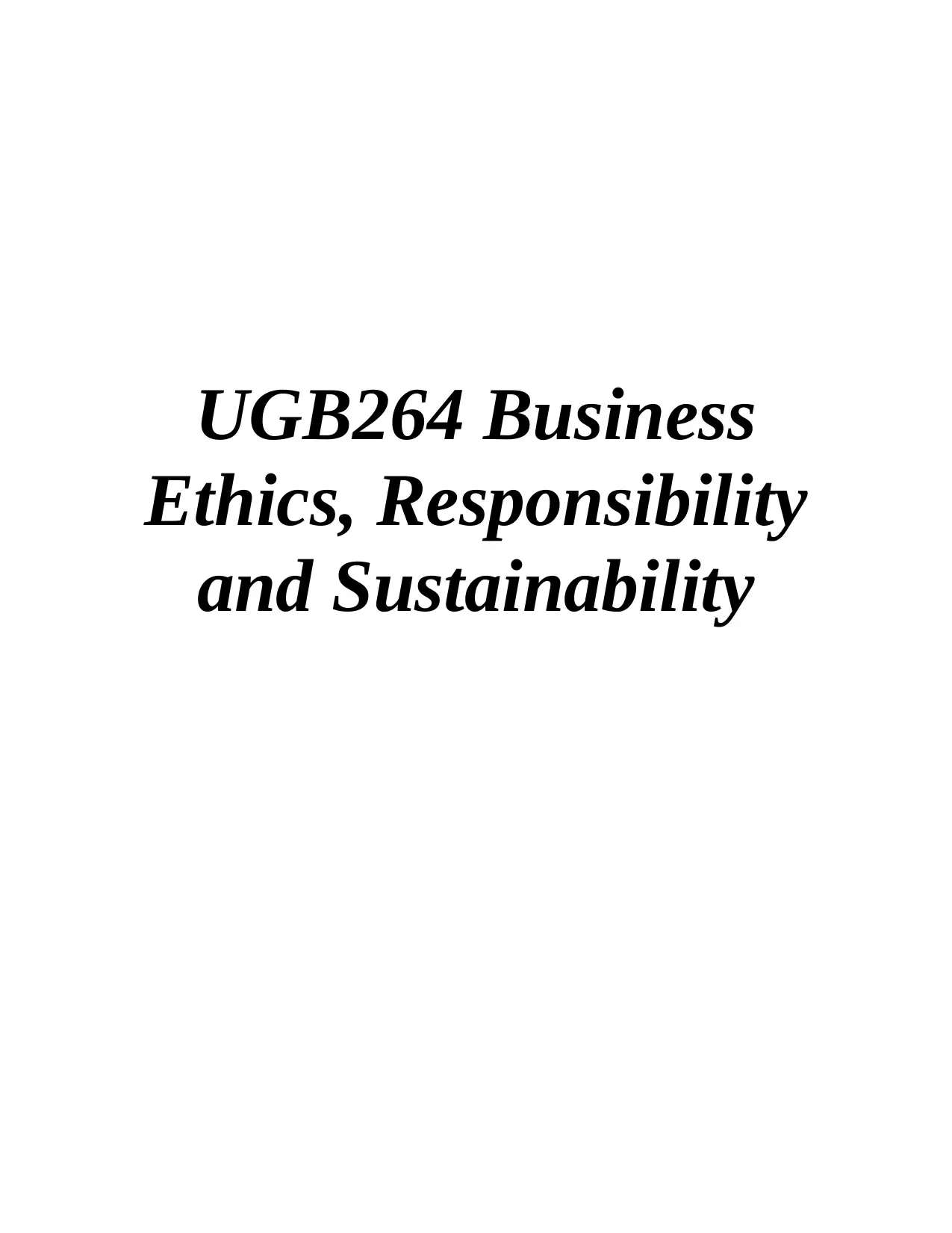
UGB264 Business
Ethics, Responsibility
and Sustainability
Ethics, Responsibility
and Sustainability
Paraphrase This Document
Need a fresh take? Get an instant paraphrase of this document with our AI Paraphraser
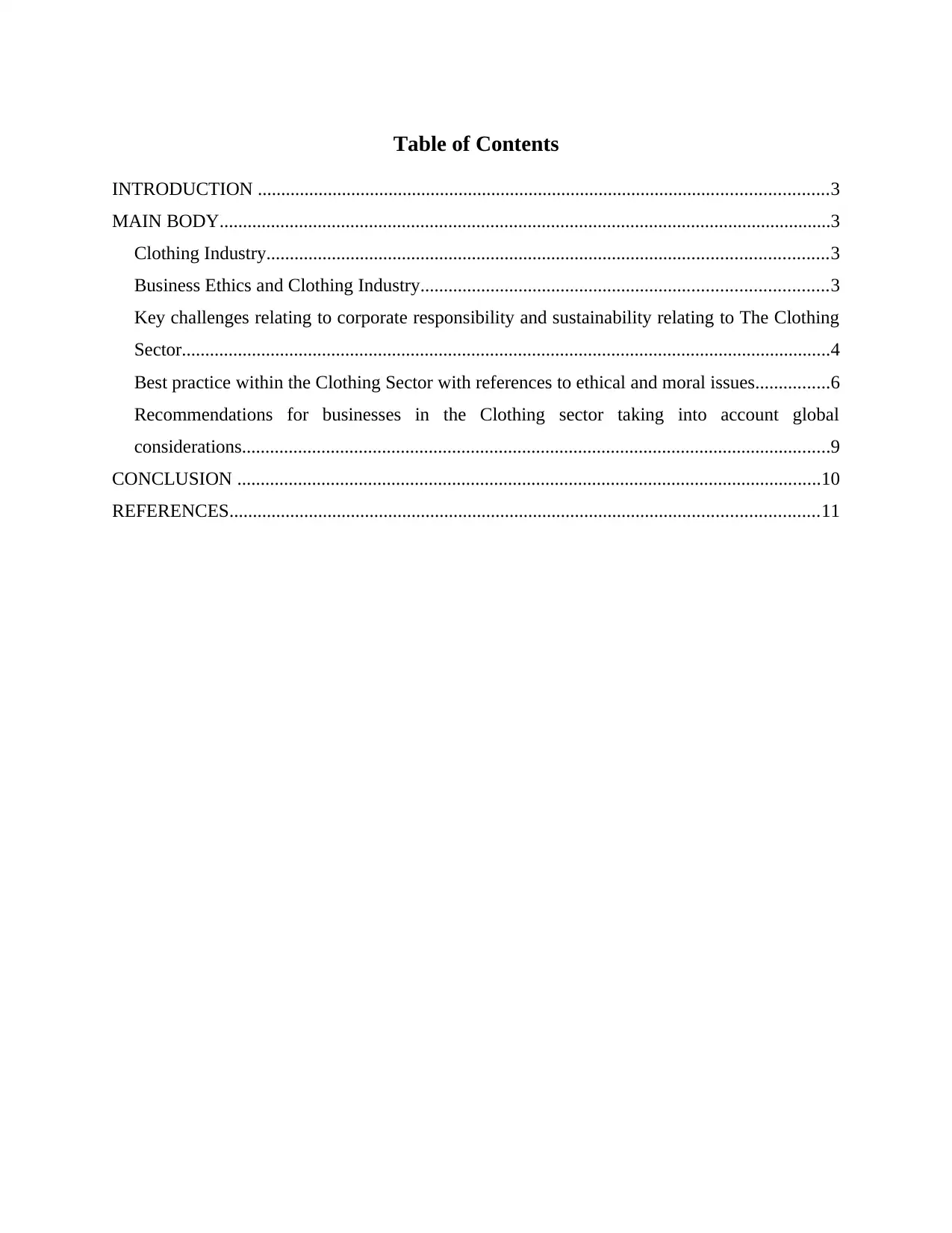
Table of Contents
INTRODUCTION ..........................................................................................................................3
MAIN BODY...................................................................................................................................3
Clothing Industry........................................................................................................................3
Business Ethics and Clothing Industry.......................................................................................3
Key challenges relating to corporate responsibility and sustainability relating to The Clothing
Sector...........................................................................................................................................4
Best practice within the Clothing Sector with references to ethical and moral issues................6
Recommendations for businesses in the Clothing sector taking into account global
considerations..............................................................................................................................9
CONCLUSION .............................................................................................................................10
REFERENCES..............................................................................................................................11
INTRODUCTION ..........................................................................................................................3
MAIN BODY...................................................................................................................................3
Clothing Industry........................................................................................................................3
Business Ethics and Clothing Industry.......................................................................................3
Key challenges relating to corporate responsibility and sustainability relating to The Clothing
Sector...........................................................................................................................................4
Best practice within the Clothing Sector with references to ethical and moral issues................6
Recommendations for businesses in the Clothing sector taking into account global
considerations..............................................................................................................................9
CONCLUSION .............................................................................................................................10
REFERENCES..............................................................................................................................11
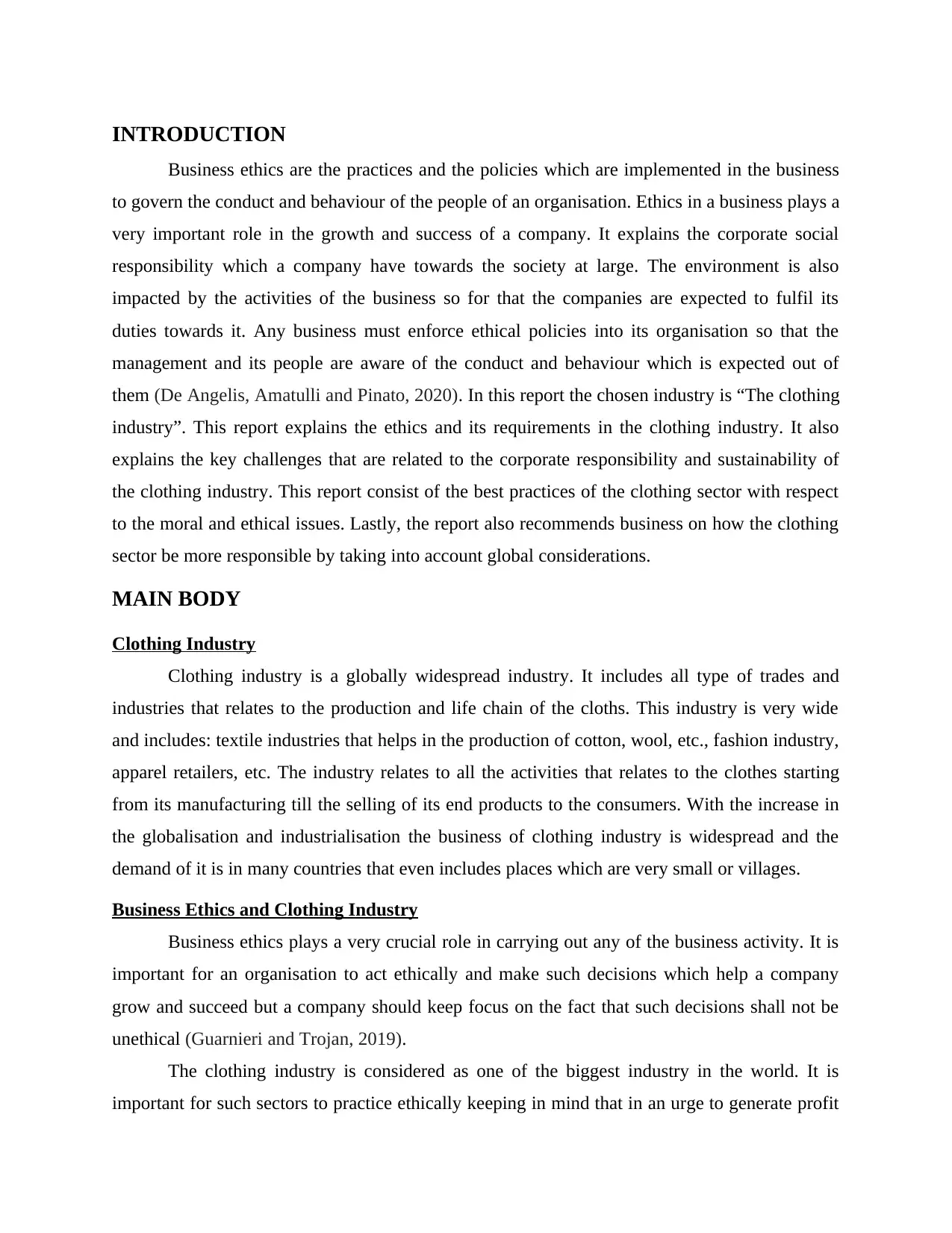
INTRODUCTION
Business ethics are the practices and the policies which are implemented in the business
to govern the conduct and behaviour of the people of an organisation. Ethics in a business plays a
very important role in the growth and success of a company. It explains the corporate social
responsibility which a company have towards the society at large. The environment is also
impacted by the activities of the business so for that the companies are expected to fulfil its
duties towards it. Any business must enforce ethical policies into its organisation so that the
management and its people are aware of the conduct and behaviour which is expected out of
them (De Angelis, Amatulli and Pinato, 2020). In this report the chosen industry is “The clothing
industry”. This report explains the ethics and its requirements in the clothing industry. It also
explains the key challenges that are related to the corporate responsibility and sustainability of
the clothing industry. This report consist of the best practices of the clothing sector with respect
to the moral and ethical issues. Lastly, the report also recommends business on how the clothing
sector be more responsible by taking into account global considerations.
MAIN BODY
Clothing Industry
Clothing industry is a globally widespread industry. It includes all type of trades and
industries that relates to the production and life chain of the cloths. This industry is very wide
and includes: textile industries that helps in the production of cotton, wool, etc., fashion industry,
apparel retailers, etc. The industry relates to all the activities that relates to the clothes starting
from its manufacturing till the selling of its end products to the consumers. With the increase in
the globalisation and industrialisation the business of clothing industry is widespread and the
demand of it is in many countries that even includes places which are very small or villages.
Business Ethics and Clothing Industry
Business ethics plays a very crucial role in carrying out any of the business activity. It is
important for an organisation to act ethically and make such decisions which help a company
grow and succeed but a company should keep focus on the fact that such decisions shall not be
unethical (Guarnieri and Trojan, 2019).
The clothing industry is considered as one of the biggest industry in the world. It is
important for such sectors to practice ethically keeping in mind that in an urge to generate profit
Business ethics are the practices and the policies which are implemented in the business
to govern the conduct and behaviour of the people of an organisation. Ethics in a business plays a
very important role in the growth and success of a company. It explains the corporate social
responsibility which a company have towards the society at large. The environment is also
impacted by the activities of the business so for that the companies are expected to fulfil its
duties towards it. Any business must enforce ethical policies into its organisation so that the
management and its people are aware of the conduct and behaviour which is expected out of
them (De Angelis, Amatulli and Pinato, 2020). In this report the chosen industry is “The clothing
industry”. This report explains the ethics and its requirements in the clothing industry. It also
explains the key challenges that are related to the corporate responsibility and sustainability of
the clothing industry. This report consist of the best practices of the clothing sector with respect
to the moral and ethical issues. Lastly, the report also recommends business on how the clothing
sector be more responsible by taking into account global considerations.
MAIN BODY
Clothing Industry
Clothing industry is a globally widespread industry. It includes all type of trades and
industries that relates to the production and life chain of the cloths. This industry is very wide
and includes: textile industries that helps in the production of cotton, wool, etc., fashion industry,
apparel retailers, etc. The industry relates to all the activities that relates to the clothes starting
from its manufacturing till the selling of its end products to the consumers. With the increase in
the globalisation and industrialisation the business of clothing industry is widespread and the
demand of it is in many countries that even includes places which are very small or villages.
Business Ethics and Clothing Industry
Business ethics plays a very crucial role in carrying out any of the business activity. It is
important for an organisation to act ethically and make such decisions which help a company
grow and succeed but a company should keep focus on the fact that such decisions shall not be
unethical (Guarnieri and Trojan, 2019).
The clothing industry is considered as one of the biggest industry in the world. It is
important for such sectors to practice ethically keeping in mind that in an urge to generate profit
⊘ This is a preview!⊘
Do you want full access?
Subscribe today to unlock all pages.

Trusted by 1+ million students worldwide
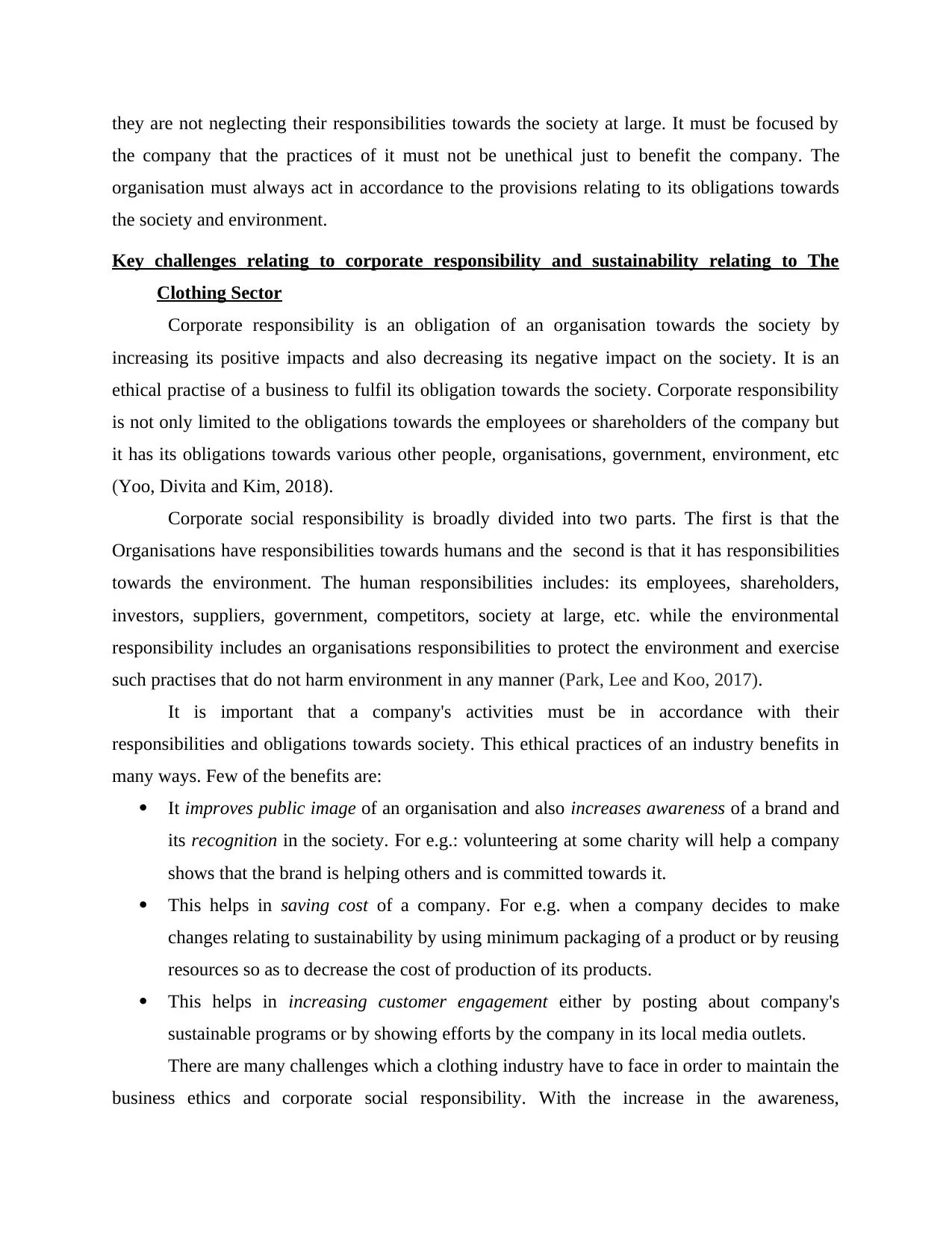
they are not neglecting their responsibilities towards the society at large. It must be focused by
the company that the practices of it must not be unethical just to benefit the company. The
organisation must always act in accordance to the provisions relating to its obligations towards
the society and environment.
Key challenges relating to corporate responsibility and sustainability relating to The
Clothing Sector
Corporate responsibility is an obligation of an organisation towards the society by
increasing its positive impacts and also decreasing its negative impact on the society. It is an
ethical practise of a business to fulfil its obligation towards the society. Corporate responsibility
is not only limited to the obligations towards the employees or shareholders of the company but
it has its obligations towards various other people, organisations, government, environment, etc
(Yoo, Divita and Kim, 2018).
Corporate social responsibility is broadly divided into two parts. The first is that the
Organisations have responsibilities towards humans and the second is that it has responsibilities
towards the environment. The human responsibilities includes: its employees, shareholders,
investors, suppliers, government, competitors, society at large, etc. while the environmental
responsibility includes an organisations responsibilities to protect the environment and exercise
such practises that do not harm environment in any manner (Park, Lee and Koo, 2017).
It is important that a company's activities must be in accordance with their
responsibilities and obligations towards society. This ethical practices of an industry benefits in
many ways. Few of the benefits are:
It improves public image of an organisation and also increases awareness of a brand and
its recognition in the society. For e.g.: volunteering at some charity will help a company
shows that the brand is helping others and is committed towards it.
This helps in saving cost of a company. For e.g. when a company decides to make
changes relating to sustainability by using minimum packaging of a product or by reusing
resources so as to decrease the cost of production of its products.
This helps in increasing customer engagement either by posting about company's
sustainable programs or by showing efforts by the company in its local media outlets.
There are many challenges which a clothing industry have to face in order to maintain the
business ethics and corporate social responsibility. With the increase in the awareness,
the company that the practices of it must not be unethical just to benefit the company. The
organisation must always act in accordance to the provisions relating to its obligations towards
the society and environment.
Key challenges relating to corporate responsibility and sustainability relating to The
Clothing Sector
Corporate responsibility is an obligation of an organisation towards the society by
increasing its positive impacts and also decreasing its negative impact on the society. It is an
ethical practise of a business to fulfil its obligation towards the society. Corporate responsibility
is not only limited to the obligations towards the employees or shareholders of the company but
it has its obligations towards various other people, organisations, government, environment, etc
(Yoo, Divita and Kim, 2018).
Corporate social responsibility is broadly divided into two parts. The first is that the
Organisations have responsibilities towards humans and the second is that it has responsibilities
towards the environment. The human responsibilities includes: its employees, shareholders,
investors, suppliers, government, competitors, society at large, etc. while the environmental
responsibility includes an organisations responsibilities to protect the environment and exercise
such practises that do not harm environment in any manner (Park, Lee and Koo, 2017).
It is important that a company's activities must be in accordance with their
responsibilities and obligations towards society. This ethical practices of an industry benefits in
many ways. Few of the benefits are:
It improves public image of an organisation and also increases awareness of a brand and
its recognition in the society. For e.g.: volunteering at some charity will help a company
shows that the brand is helping others and is committed towards it.
This helps in saving cost of a company. For e.g. when a company decides to make
changes relating to sustainability by using minimum packaging of a product or by reusing
resources so as to decrease the cost of production of its products.
This helps in increasing customer engagement either by posting about company's
sustainable programs or by showing efforts by the company in its local media outlets.
There are many challenges which a clothing industry have to face in order to maintain the
business ethics and corporate social responsibility. With the increase in the awareness,
Paraphrase This Document
Need a fresh take? Get an instant paraphrase of this document with our AI Paraphraser
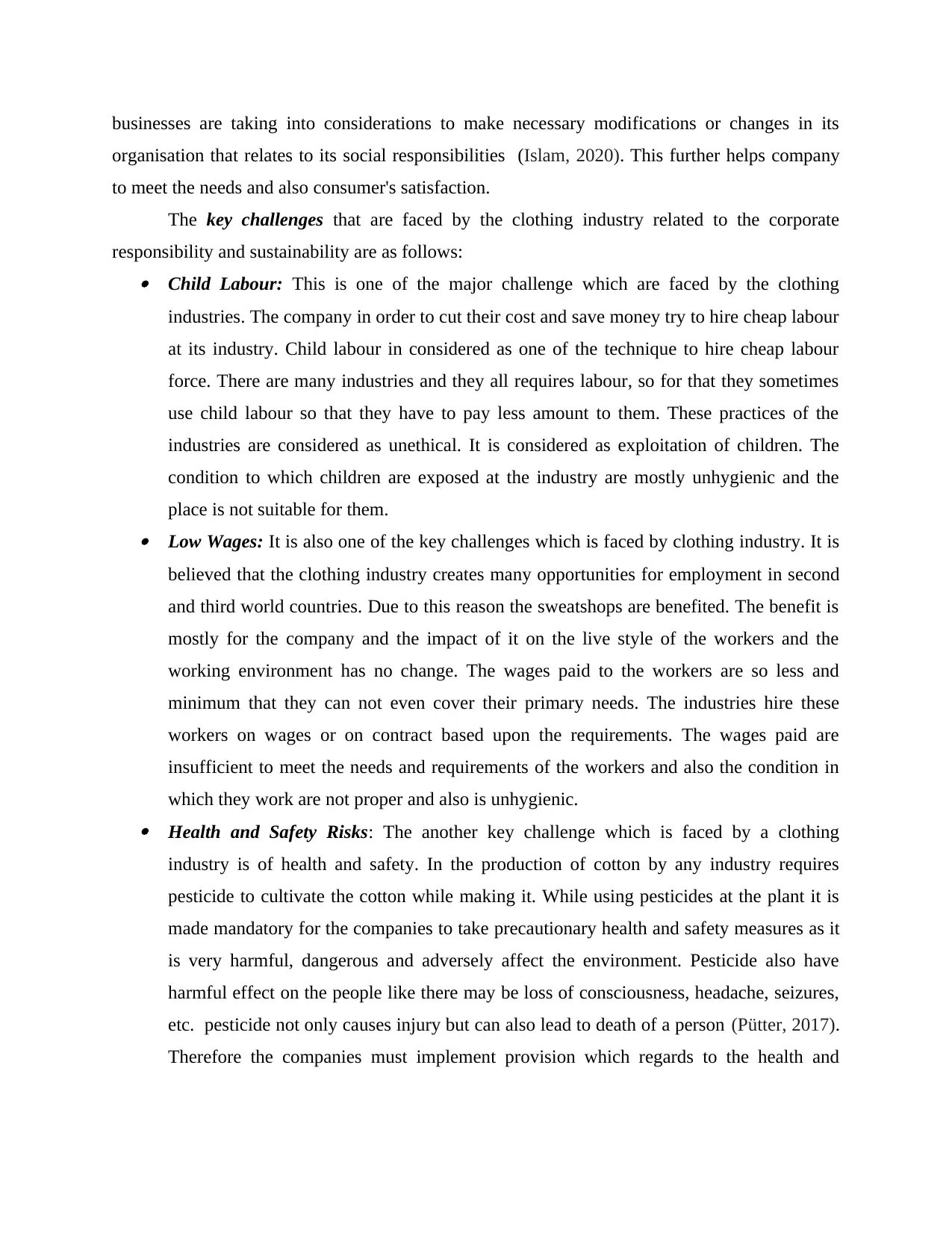
businesses are taking into considerations to make necessary modifications or changes in its
organisation that relates to its social responsibilities (Islam, 2020). This further helps company
to meet the needs and also consumer's satisfaction.
The key challenges that are faced by the clothing industry related to the corporate
responsibility and sustainability are as follows: Child Labour: This is one of the major challenge which are faced by the clothing
industries. The company in order to cut their cost and save money try to hire cheap labour
at its industry. Child labour in considered as one of the technique to hire cheap labour
force. There are many industries and they all requires labour, so for that they sometimes
use child labour so that they have to pay less amount to them. These practices of the
industries are considered as unethical. It is considered as exploitation of children. The
condition to which children are exposed at the industry are mostly unhygienic and the
place is not suitable for them. Low Wages: It is also one of the key challenges which is faced by clothing industry. It is
believed that the clothing industry creates many opportunities for employment in second
and third world countries. Due to this reason the sweatshops are benefited. The benefit is
mostly for the company and the impact of it on the live style of the workers and the
working environment has no change. The wages paid to the workers are so less and
minimum that they can not even cover their primary needs. The industries hire these
workers on wages or on contract based upon the requirements. The wages paid are
insufficient to meet the needs and requirements of the workers and also the condition in
which they work are not proper and also is unhygienic. Health and Safety Risks: The another key challenge which is faced by a clothing
industry is of health and safety. In the production of cotton by any industry requires
pesticide to cultivate the cotton while making it. While using pesticides at the plant it is
made mandatory for the companies to take precautionary health and safety measures as it
is very harmful, dangerous and adversely affect the environment. Pesticide also have
harmful effect on the people like there may be loss of consciousness, headache, seizures,
etc. pesticide not only causes injury but can also lead to death of a person (Pütter, 2017).
Therefore the companies must implement provision which regards to the health and
organisation that relates to its social responsibilities (Islam, 2020). This further helps company
to meet the needs and also consumer's satisfaction.
The key challenges that are faced by the clothing industry related to the corporate
responsibility and sustainability are as follows: Child Labour: This is one of the major challenge which are faced by the clothing
industries. The company in order to cut their cost and save money try to hire cheap labour
at its industry. Child labour in considered as one of the technique to hire cheap labour
force. There are many industries and they all requires labour, so for that they sometimes
use child labour so that they have to pay less amount to them. These practices of the
industries are considered as unethical. It is considered as exploitation of children. The
condition to which children are exposed at the industry are mostly unhygienic and the
place is not suitable for them. Low Wages: It is also one of the key challenges which is faced by clothing industry. It is
believed that the clothing industry creates many opportunities for employment in second
and third world countries. Due to this reason the sweatshops are benefited. The benefit is
mostly for the company and the impact of it on the live style of the workers and the
working environment has no change. The wages paid to the workers are so less and
minimum that they can not even cover their primary needs. The industries hire these
workers on wages or on contract based upon the requirements. The wages paid are
insufficient to meet the needs and requirements of the workers and also the condition in
which they work are not proper and also is unhygienic. Health and Safety Risks: The another key challenge which is faced by a clothing
industry is of health and safety. In the production of cotton by any industry requires
pesticide to cultivate the cotton while making it. While using pesticides at the plant it is
made mandatory for the companies to take precautionary health and safety measures as it
is very harmful, dangerous and adversely affect the environment. Pesticide also have
harmful effect on the people like there may be loss of consciousness, headache, seizures,
etc. pesticide not only causes injury but can also lead to death of a person (Pütter, 2017).
Therefore the companies must implement provision which regards to the health and
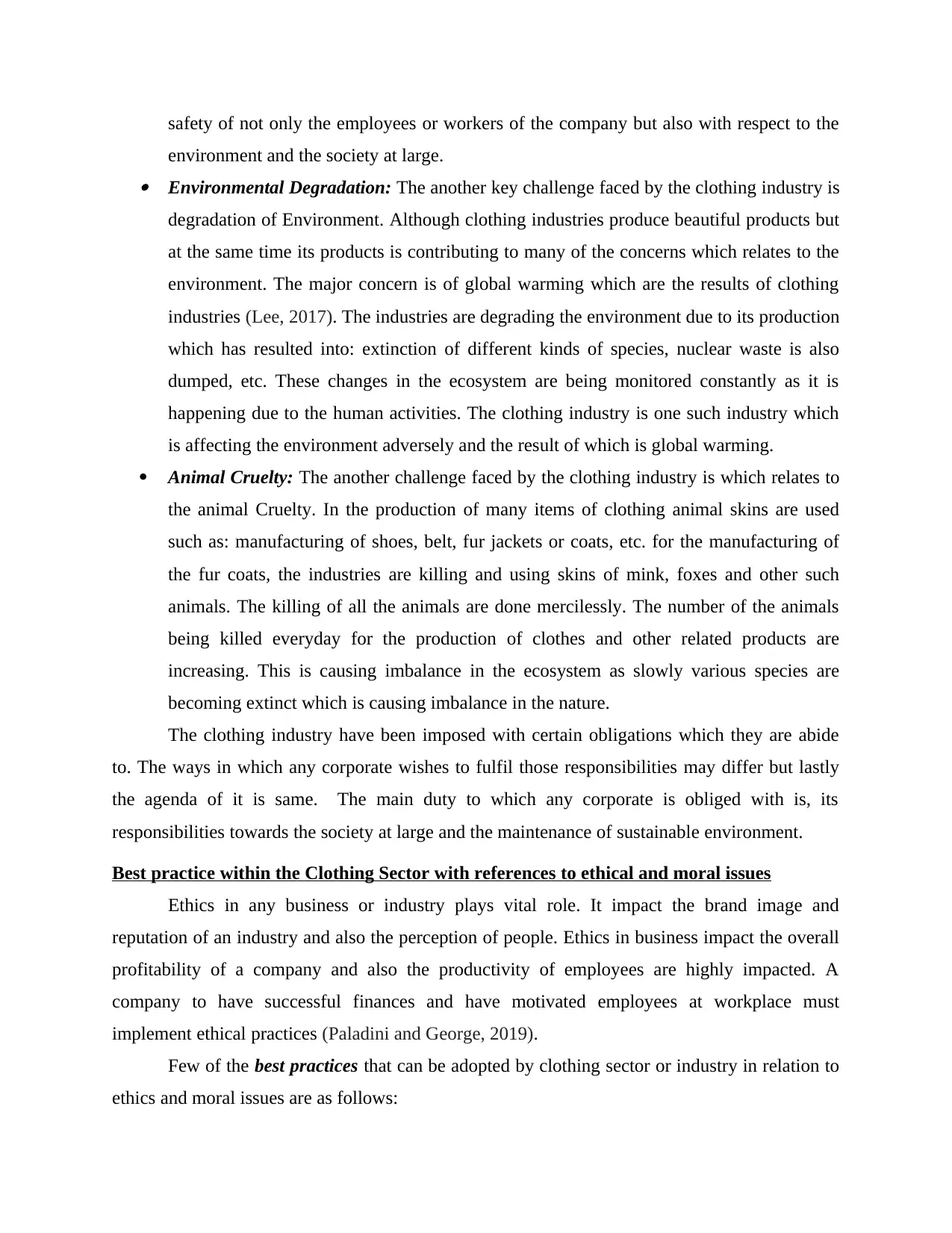
safety of not only the employees or workers of the company but also with respect to the
environment and the society at large. Environmental Degradation: The another key challenge faced by the clothing industry is
degradation of Environment. Although clothing industries produce beautiful products but
at the same time its products is contributing to many of the concerns which relates to the
environment. The major concern is of global warming which are the results of clothing
industries (Lee, 2017). The industries are degrading the environment due to its production
which has resulted into: extinction of different kinds of species, nuclear waste is also
dumped, etc. These changes in the ecosystem are being monitored constantly as it is
happening due to the human activities. The clothing industry is one such industry which
is affecting the environment adversely and the result of which is global warming.
Animal Cruelty: The another challenge faced by the clothing industry is which relates to
the animal Cruelty. In the production of many items of clothing animal skins are used
such as: manufacturing of shoes, belt, fur jackets or coats, etc. for the manufacturing of
the fur coats, the industries are killing and using skins of mink, foxes and other such
animals. The killing of all the animals are done mercilessly. The number of the animals
being killed everyday for the production of clothes and other related products are
increasing. This is causing imbalance in the ecosystem as slowly various species are
becoming extinct which is causing imbalance in the nature.
The clothing industry have been imposed with certain obligations which they are abide
to. The ways in which any corporate wishes to fulfil those responsibilities may differ but lastly
the agenda of it is same. The main duty to which any corporate is obliged with is, its
responsibilities towards the society at large and the maintenance of sustainable environment.
Best practice within the Clothing Sector with references to ethical and moral issues
Ethics in any business or industry plays vital role. It impact the brand image and
reputation of an industry and also the perception of people. Ethics in business impact the overall
profitability of a company and also the productivity of employees are highly impacted. A
company to have successful finances and have motivated employees at workplace must
implement ethical practices (Paladini and George, 2019).
Few of the best practices that can be adopted by clothing sector or industry in relation to
ethics and moral issues are as follows:
environment and the society at large. Environmental Degradation: The another key challenge faced by the clothing industry is
degradation of Environment. Although clothing industries produce beautiful products but
at the same time its products is contributing to many of the concerns which relates to the
environment. The major concern is of global warming which are the results of clothing
industries (Lee, 2017). The industries are degrading the environment due to its production
which has resulted into: extinction of different kinds of species, nuclear waste is also
dumped, etc. These changes in the ecosystem are being monitored constantly as it is
happening due to the human activities. The clothing industry is one such industry which
is affecting the environment adversely and the result of which is global warming.
Animal Cruelty: The another challenge faced by the clothing industry is which relates to
the animal Cruelty. In the production of many items of clothing animal skins are used
such as: manufacturing of shoes, belt, fur jackets or coats, etc. for the manufacturing of
the fur coats, the industries are killing and using skins of mink, foxes and other such
animals. The killing of all the animals are done mercilessly. The number of the animals
being killed everyday for the production of clothes and other related products are
increasing. This is causing imbalance in the ecosystem as slowly various species are
becoming extinct which is causing imbalance in the nature.
The clothing industry have been imposed with certain obligations which they are abide
to. The ways in which any corporate wishes to fulfil those responsibilities may differ but lastly
the agenda of it is same. The main duty to which any corporate is obliged with is, its
responsibilities towards the society at large and the maintenance of sustainable environment.
Best practice within the Clothing Sector with references to ethical and moral issues
Ethics in any business or industry plays vital role. It impact the brand image and
reputation of an industry and also the perception of people. Ethics in business impact the overall
profitability of a company and also the productivity of employees are highly impacted. A
company to have successful finances and have motivated employees at workplace must
implement ethical practices (Paladini and George, 2019).
Few of the best practices that can be adopted by clothing sector or industry in relation to
ethics and moral issues are as follows:
⊘ This is a preview!⊘
Do you want full access?
Subscribe today to unlock all pages.

Trusted by 1+ million students worldwide
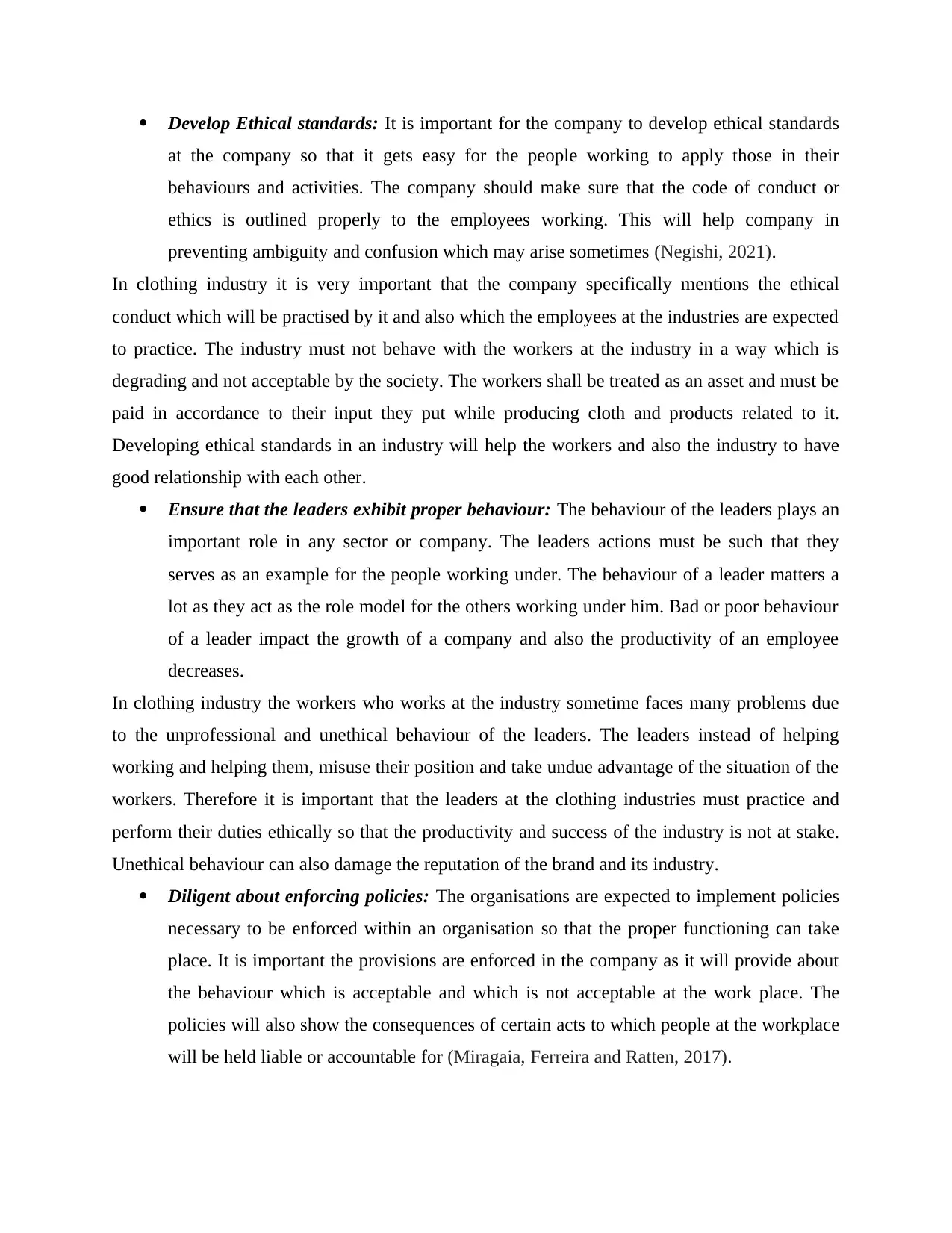
Develop Ethical standards: It is important for the company to develop ethical standards
at the company so that it gets easy for the people working to apply those in their
behaviours and activities. The company should make sure that the code of conduct or
ethics is outlined properly to the employees working. This will help company in
preventing ambiguity and confusion which may arise sometimes (Negishi, 2021).
In clothing industry it is very important that the company specifically mentions the ethical
conduct which will be practised by it and also which the employees at the industries are expected
to practice. The industry must not behave with the workers at the industry in a way which is
degrading and not acceptable by the society. The workers shall be treated as an asset and must be
paid in accordance to their input they put while producing cloth and products related to it.
Developing ethical standards in an industry will help the workers and also the industry to have
good relationship with each other.
Ensure that the leaders exhibit proper behaviour: The behaviour of the leaders plays an
important role in any sector or company. The leaders actions must be such that they
serves as an example for the people working under. The behaviour of a leader matters a
lot as they act as the role model for the others working under him. Bad or poor behaviour
of a leader impact the growth of a company and also the productivity of an employee
decreases.
In clothing industry the workers who works at the industry sometime faces many problems due
to the unprofessional and unethical behaviour of the leaders. The leaders instead of helping
working and helping them, misuse their position and take undue advantage of the situation of the
workers. Therefore it is important that the leaders at the clothing industries must practice and
perform their duties ethically so that the productivity and success of the industry is not at stake.
Unethical behaviour can also damage the reputation of the brand and its industry.
Diligent about enforcing policies: The organisations are expected to implement policies
necessary to be enforced within an organisation so that the proper functioning can take
place. It is important the provisions are enforced in the company as it will provide about
the behaviour which is acceptable and which is not acceptable at the work place. The
policies will also show the consequences of certain acts to which people at the workplace
will be held liable or accountable for (Miragaia, Ferreira and Ratten, 2017).
at the company so that it gets easy for the people working to apply those in their
behaviours and activities. The company should make sure that the code of conduct or
ethics is outlined properly to the employees working. This will help company in
preventing ambiguity and confusion which may arise sometimes (Negishi, 2021).
In clothing industry it is very important that the company specifically mentions the ethical
conduct which will be practised by it and also which the employees at the industries are expected
to practice. The industry must not behave with the workers at the industry in a way which is
degrading and not acceptable by the society. The workers shall be treated as an asset and must be
paid in accordance to their input they put while producing cloth and products related to it.
Developing ethical standards in an industry will help the workers and also the industry to have
good relationship with each other.
Ensure that the leaders exhibit proper behaviour: The behaviour of the leaders plays an
important role in any sector or company. The leaders actions must be such that they
serves as an example for the people working under. The behaviour of a leader matters a
lot as they act as the role model for the others working under him. Bad or poor behaviour
of a leader impact the growth of a company and also the productivity of an employee
decreases.
In clothing industry the workers who works at the industry sometime faces many problems due
to the unprofessional and unethical behaviour of the leaders. The leaders instead of helping
working and helping them, misuse their position and take undue advantage of the situation of the
workers. Therefore it is important that the leaders at the clothing industries must practice and
perform their duties ethically so that the productivity and success of the industry is not at stake.
Unethical behaviour can also damage the reputation of the brand and its industry.
Diligent about enforcing policies: The organisations are expected to implement policies
necessary to be enforced within an organisation so that the proper functioning can take
place. It is important the provisions are enforced in the company as it will provide about
the behaviour which is acceptable and which is not acceptable at the work place. The
policies will also show the consequences of certain acts to which people at the workplace
will be held liable or accountable for (Miragaia, Ferreira and Ratten, 2017).
Paraphrase This Document
Need a fresh take? Get an instant paraphrase of this document with our AI Paraphraser
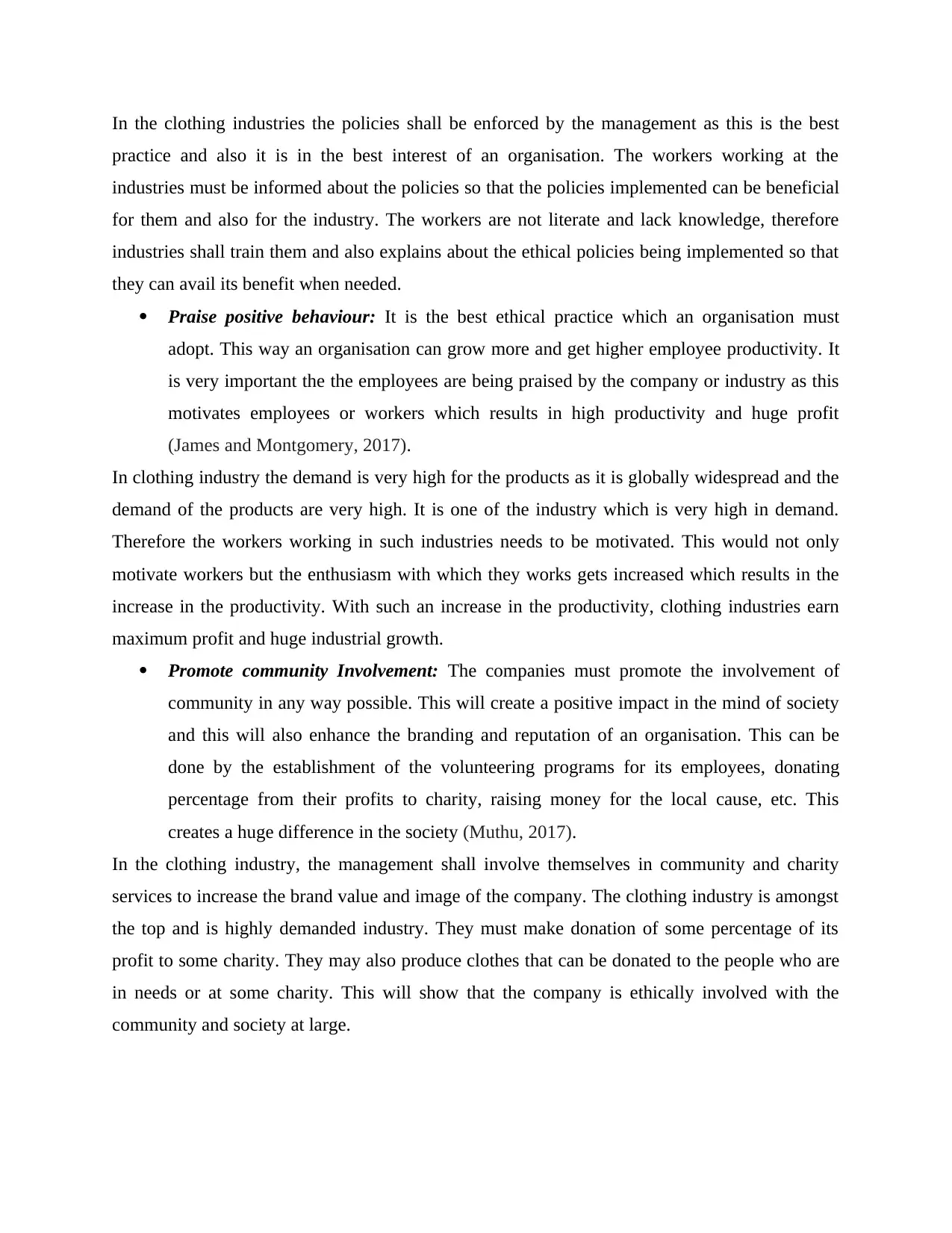
In the clothing industries the policies shall be enforced by the management as this is the best
practice and also it is in the best interest of an organisation. The workers working at the
industries must be informed about the policies so that the policies implemented can be beneficial
for them and also for the industry. The workers are not literate and lack knowledge, therefore
industries shall train them and also explains about the ethical policies being implemented so that
they can avail its benefit when needed.
Praise positive behaviour: It is the best ethical practice which an organisation must
adopt. This way an organisation can grow more and get higher employee productivity. It
is very important the the employees are being praised by the company or industry as this
motivates employees or workers which results in high productivity and huge profit
(James and Montgomery, 2017).
In clothing industry the demand is very high for the products as it is globally widespread and the
demand of the products are very high. It is one of the industry which is very high in demand.
Therefore the workers working in such industries needs to be motivated. This would not only
motivate workers but the enthusiasm with which they works gets increased which results in the
increase in the productivity. With such an increase in the productivity, clothing industries earn
maximum profit and huge industrial growth.
Promote community Involvement: The companies must promote the involvement of
community in any way possible. This will create a positive impact in the mind of society
and this will also enhance the branding and reputation of an organisation. This can be
done by the establishment of the volunteering programs for its employees, donating
percentage from their profits to charity, raising money for the local cause, etc. This
creates a huge difference in the society (Muthu, 2017).
In the clothing industry, the management shall involve themselves in community and charity
services to increase the brand value and image of the company. The clothing industry is amongst
the top and is highly demanded industry. They must make donation of some percentage of its
profit to some charity. They may also produce clothes that can be donated to the people who are
in needs or at some charity. This will show that the company is ethically involved with the
community and society at large.
practice and also it is in the best interest of an organisation. The workers working at the
industries must be informed about the policies so that the policies implemented can be beneficial
for them and also for the industry. The workers are not literate and lack knowledge, therefore
industries shall train them and also explains about the ethical policies being implemented so that
they can avail its benefit when needed.
Praise positive behaviour: It is the best ethical practice which an organisation must
adopt. This way an organisation can grow more and get higher employee productivity. It
is very important the the employees are being praised by the company or industry as this
motivates employees or workers which results in high productivity and huge profit
(James and Montgomery, 2017).
In clothing industry the demand is very high for the products as it is globally widespread and the
demand of the products are very high. It is one of the industry which is very high in demand.
Therefore the workers working in such industries needs to be motivated. This would not only
motivate workers but the enthusiasm with which they works gets increased which results in the
increase in the productivity. With such an increase in the productivity, clothing industries earn
maximum profit and huge industrial growth.
Promote community Involvement: The companies must promote the involvement of
community in any way possible. This will create a positive impact in the mind of society
and this will also enhance the branding and reputation of an organisation. This can be
done by the establishment of the volunteering programs for its employees, donating
percentage from their profits to charity, raising money for the local cause, etc. This
creates a huge difference in the society (Muthu, 2017).
In the clothing industry, the management shall involve themselves in community and charity
services to increase the brand value and image of the company. The clothing industry is amongst
the top and is highly demanded industry. They must make donation of some percentage of its
profit to some charity. They may also produce clothes that can be donated to the people who are
in needs or at some charity. This will show that the company is ethically involved with the
community and society at large.
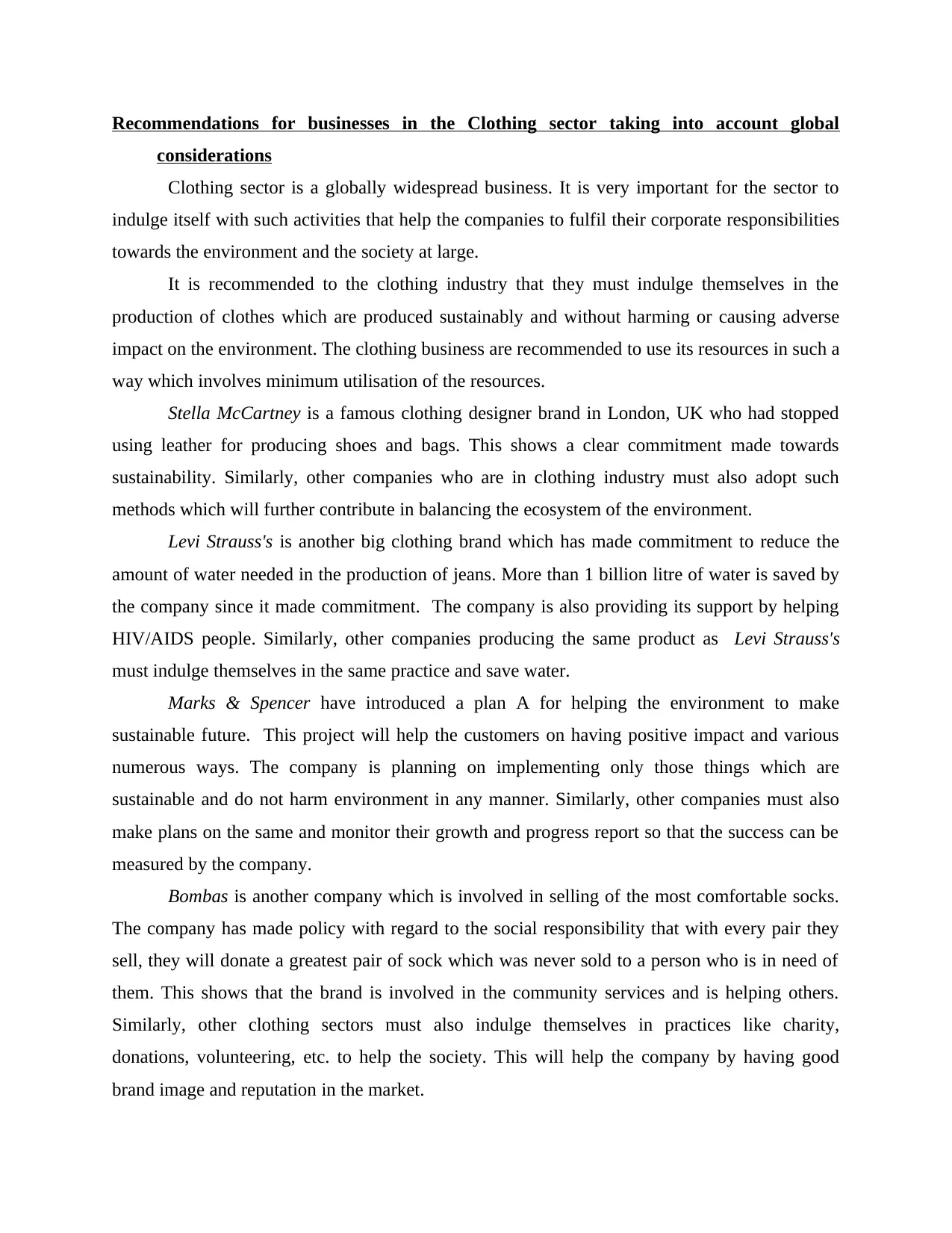
Recommendations for businesses in the Clothing sector taking into account global
considerations
Clothing sector is a globally widespread business. It is very important for the sector to
indulge itself with such activities that help the companies to fulfil their corporate responsibilities
towards the environment and the society at large.
It is recommended to the clothing industry that they must indulge themselves in the
production of clothes which are produced sustainably and without harming or causing adverse
impact on the environment. The clothing business are recommended to use its resources in such a
way which involves minimum utilisation of the resources.
Stella McCartney is a famous clothing designer brand in London, UK who had stopped
using leather for producing shoes and bags. This shows a clear commitment made towards
sustainability. Similarly, other companies who are in clothing industry must also adopt such
methods which will further contribute in balancing the ecosystem of the environment.
Levi Strauss's is another big clothing brand which has made commitment to reduce the
amount of water needed in the production of jeans. More than 1 billion litre of water is saved by
the company since it made commitment. The company is also providing its support by helping
HIV/AIDS people. Similarly, other companies producing the same product as Levi Strauss's
must indulge themselves in the same practice and save water.
Marks & Spencer have introduced a plan A for helping the environment to make
sustainable future. This project will help the customers on having positive impact and various
numerous ways. The company is planning on implementing only those things which are
sustainable and do not harm environment in any manner. Similarly, other companies must also
make plans on the same and monitor their growth and progress report so that the success can be
measured by the company.
Bombas is another company which is involved in selling of the most comfortable socks.
The company has made policy with regard to the social responsibility that with every pair they
sell, they will donate a greatest pair of sock which was never sold to a person who is in need of
them. This shows that the brand is involved in the community services and is helping others.
Similarly, other clothing sectors must also indulge themselves in practices like charity,
donations, volunteering, etc. to help the society. This will help the company by having good
brand image and reputation in the market.
considerations
Clothing sector is a globally widespread business. It is very important for the sector to
indulge itself with such activities that help the companies to fulfil their corporate responsibilities
towards the environment and the society at large.
It is recommended to the clothing industry that they must indulge themselves in the
production of clothes which are produced sustainably and without harming or causing adverse
impact on the environment. The clothing business are recommended to use its resources in such a
way which involves minimum utilisation of the resources.
Stella McCartney is a famous clothing designer brand in London, UK who had stopped
using leather for producing shoes and bags. This shows a clear commitment made towards
sustainability. Similarly, other companies who are in clothing industry must also adopt such
methods which will further contribute in balancing the ecosystem of the environment.
Levi Strauss's is another big clothing brand which has made commitment to reduce the
amount of water needed in the production of jeans. More than 1 billion litre of water is saved by
the company since it made commitment. The company is also providing its support by helping
HIV/AIDS people. Similarly, other companies producing the same product as Levi Strauss's
must indulge themselves in the same practice and save water.
Marks & Spencer have introduced a plan A for helping the environment to make
sustainable future. This project will help the customers on having positive impact and various
numerous ways. The company is planning on implementing only those things which are
sustainable and do not harm environment in any manner. Similarly, other companies must also
make plans on the same and monitor their growth and progress report so that the success can be
measured by the company.
Bombas is another company which is involved in selling of the most comfortable socks.
The company has made policy with regard to the social responsibility that with every pair they
sell, they will donate a greatest pair of sock which was never sold to a person who is in need of
them. This shows that the brand is involved in the community services and is helping others.
Similarly, other clothing sectors must also indulge themselves in practices like charity,
donations, volunteering, etc. to help the society. This will help the company by having good
brand image and reputation in the market.
⊘ This is a preview!⊘
Do you want full access?
Subscribe today to unlock all pages.

Trusted by 1+ million students worldwide
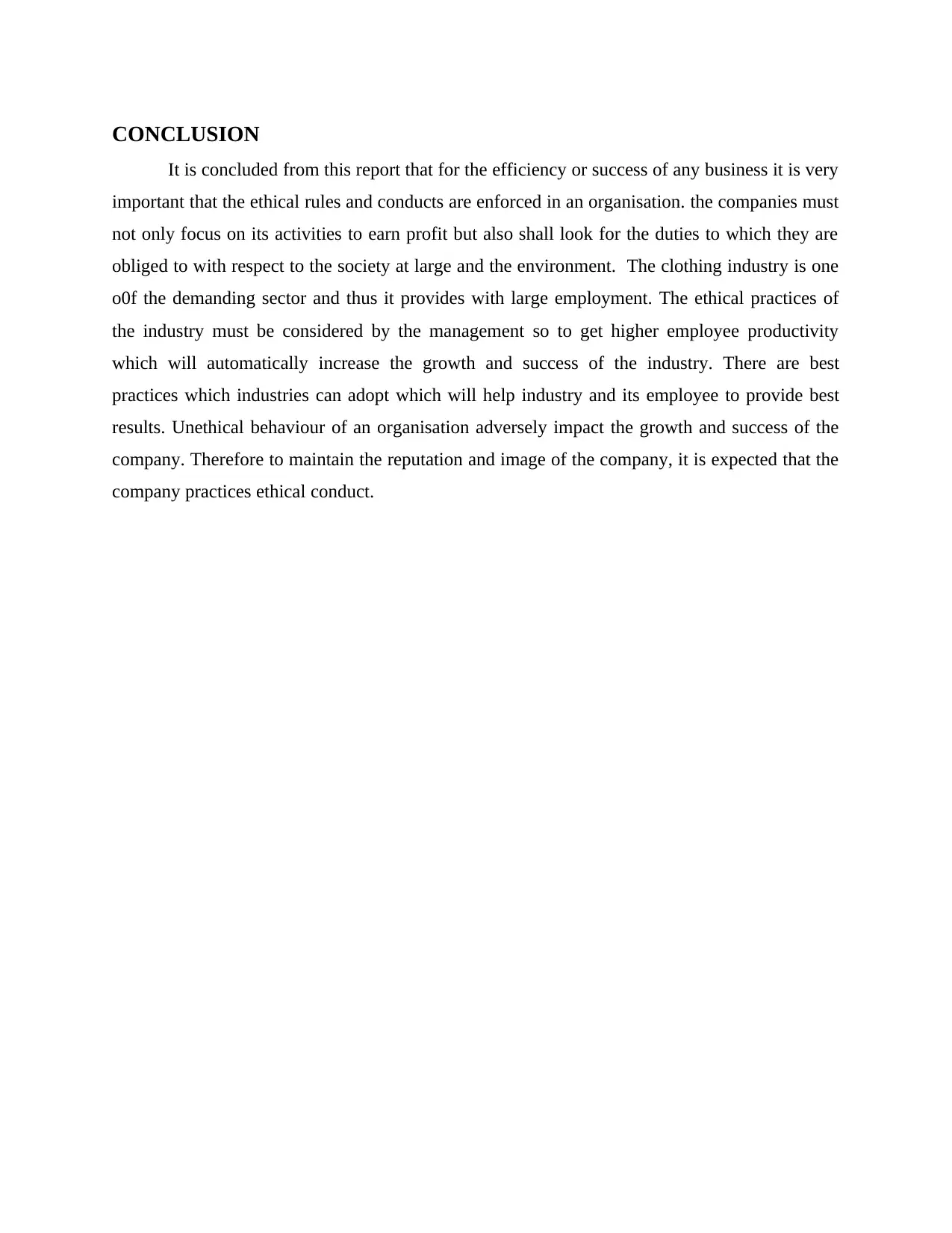
CONCLUSION
It is concluded from this report that for the efficiency or success of any business it is very
important that the ethical rules and conducts are enforced in an organisation. the companies must
not only focus on its activities to earn profit but also shall look for the duties to which they are
obliged to with respect to the society at large and the environment. The clothing industry is one
o0f the demanding sector and thus it provides with large employment. The ethical practices of
the industry must be considered by the management so to get higher employee productivity
which will automatically increase the growth and success of the industry. There are best
practices which industries can adopt which will help industry and its employee to provide best
results. Unethical behaviour of an organisation adversely impact the growth and success of the
company. Therefore to maintain the reputation and image of the company, it is expected that the
company practices ethical conduct.
It is concluded from this report that for the efficiency or success of any business it is very
important that the ethical rules and conducts are enforced in an organisation. the companies must
not only focus on its activities to earn profit but also shall look for the duties to which they are
obliged to with respect to the society at large and the environment. The clothing industry is one
o0f the demanding sector and thus it provides with large employment. The ethical practices of
the industry must be considered by the management so to get higher employee productivity
which will automatically increase the growth and success of the industry. There are best
practices which industries can adopt which will help industry and its employee to provide best
results. Unethical behaviour of an organisation adversely impact the growth and success of the
company. Therefore to maintain the reputation and image of the company, it is expected that the
company practices ethical conduct.
Paraphrase This Document
Need a fresh take? Get an instant paraphrase of this document with our AI Paraphraser
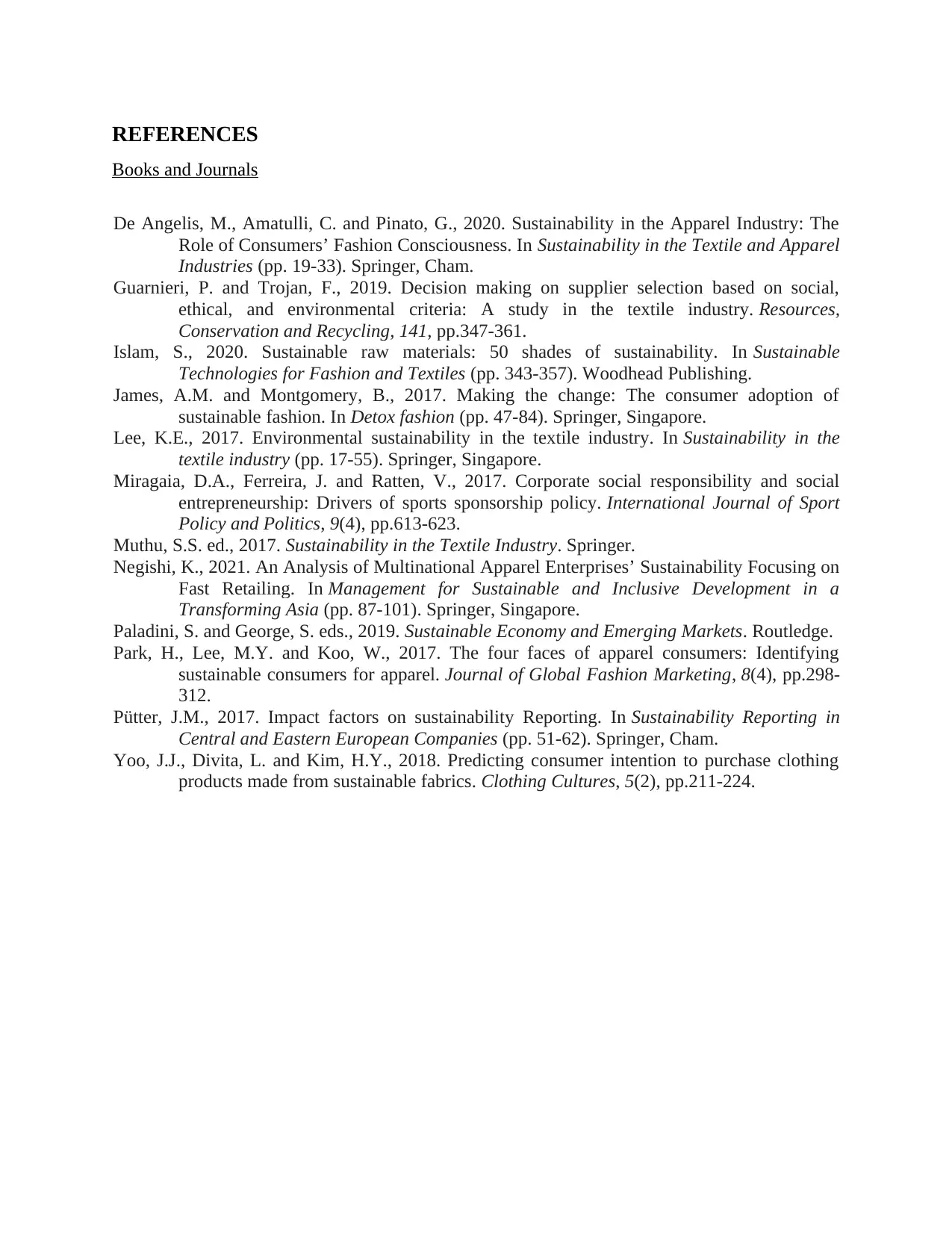
REFERENCES
Books and Journals
De Angelis, M., Amatulli, C. and Pinato, G., 2020. Sustainability in the Apparel Industry: The
Role of Consumers’ Fashion Consciousness. In Sustainability in the Textile and Apparel
Industries (pp. 19-33). Springer, Cham.
Guarnieri, P. and Trojan, F., 2019. Decision making on supplier selection based on social,
ethical, and environmental criteria: A study in the textile industry. Resources,
Conservation and Recycling, 141, pp.347-361.
Islam, S., 2020. Sustainable raw materials: 50 shades of sustainability. In Sustainable
Technologies for Fashion and Textiles (pp. 343-357). Woodhead Publishing.
James, A.M. and Montgomery, B., 2017. Making the change: The consumer adoption of
sustainable fashion. In Detox fashion (pp. 47-84). Springer, Singapore.
Lee, K.E., 2017. Environmental sustainability in the textile industry. In Sustainability in the
textile industry (pp. 17-55). Springer, Singapore.
Miragaia, D.A., Ferreira, J. and Ratten, V., 2017. Corporate social responsibility and social
entrepreneurship: Drivers of sports sponsorship policy. International Journal of Sport
Policy and Politics, 9(4), pp.613-623.
Muthu, S.S. ed., 2017. Sustainability in the Textile Industry. Springer.
Negishi, K., 2021. An Analysis of Multinational Apparel Enterprises’ Sustainability Focusing on
Fast Retailing. In Management for Sustainable and Inclusive Development in a
Transforming Asia (pp. 87-101). Springer, Singapore.
Paladini, S. and George, S. eds., 2019. Sustainable Economy and Emerging Markets. Routledge.
Park, H., Lee, M.Y. and Koo, W., 2017. The four faces of apparel consumers: Identifying
sustainable consumers for apparel. Journal of Global Fashion Marketing, 8(4), pp.298-
312.
Pütter, J.M., 2017. Impact factors on sustainability Reporting. In Sustainability Reporting in
Central and Eastern European Companies (pp. 51-62). Springer, Cham.
Yoo, J.J., Divita, L. and Kim, H.Y., 2018. Predicting consumer intention to purchase clothing
products made from sustainable fabrics. Clothing Cultures, 5(2), pp.211-224.
Books and Journals
De Angelis, M., Amatulli, C. and Pinato, G., 2020. Sustainability in the Apparel Industry: The
Role of Consumers’ Fashion Consciousness. In Sustainability in the Textile and Apparel
Industries (pp. 19-33). Springer, Cham.
Guarnieri, P. and Trojan, F., 2019. Decision making on supplier selection based on social,
ethical, and environmental criteria: A study in the textile industry. Resources,
Conservation and Recycling, 141, pp.347-361.
Islam, S., 2020. Sustainable raw materials: 50 shades of sustainability. In Sustainable
Technologies for Fashion and Textiles (pp. 343-357). Woodhead Publishing.
James, A.M. and Montgomery, B., 2017. Making the change: The consumer adoption of
sustainable fashion. In Detox fashion (pp. 47-84). Springer, Singapore.
Lee, K.E., 2017. Environmental sustainability in the textile industry. In Sustainability in the
textile industry (pp. 17-55). Springer, Singapore.
Miragaia, D.A., Ferreira, J. and Ratten, V., 2017. Corporate social responsibility and social
entrepreneurship: Drivers of sports sponsorship policy. International Journal of Sport
Policy and Politics, 9(4), pp.613-623.
Muthu, S.S. ed., 2017. Sustainability in the Textile Industry. Springer.
Negishi, K., 2021. An Analysis of Multinational Apparel Enterprises’ Sustainability Focusing on
Fast Retailing. In Management for Sustainable and Inclusive Development in a
Transforming Asia (pp. 87-101). Springer, Singapore.
Paladini, S. and George, S. eds., 2019. Sustainable Economy and Emerging Markets. Routledge.
Park, H., Lee, M.Y. and Koo, W., 2017. The four faces of apparel consumers: Identifying
sustainable consumers for apparel. Journal of Global Fashion Marketing, 8(4), pp.298-
312.
Pütter, J.M., 2017. Impact factors on sustainability Reporting. In Sustainability Reporting in
Central and Eastern European Companies (pp. 51-62). Springer, Cham.
Yoo, J.J., Divita, L. and Kim, H.Y., 2018. Predicting consumer intention to purchase clothing
products made from sustainable fabrics. Clothing Cultures, 5(2), pp.211-224.
1 out of 11
Related Documents
Your All-in-One AI-Powered Toolkit for Academic Success.
+13062052269
info@desklib.com
Available 24*7 on WhatsApp / Email
![[object Object]](/_next/static/media/star-bottom.7253800d.svg)
Unlock your academic potential
Copyright © 2020–2025 A2Z Services. All Rights Reserved. Developed and managed by ZUCOL.





